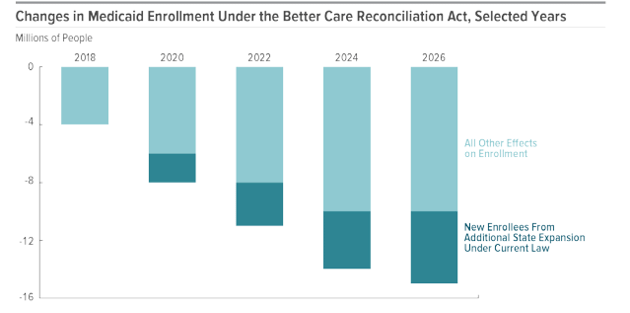Connecting state and local government leaders
The Congressional Budget Office finds that while the upper chamber’s plan is more generous and stable than the AHCA, it leaves about as many low-income people without coverage.
First, some good news: Twenty-two million more uninsured people over the next decade is at least slightly better than 23 million.
The rest of the numbers from the Congressional Budget Office aren’t so rosy for a plan Republicans hoped would score much better on coverage than its House-made predecessor. On Monday, the agency released its evaluation of the Better Care Reconciliation Act, the Senate’s take on an Obamacare replacement plan. Perhaps to Republicans’ chagrin, the CBO didn’t find much difference between the Senate’s draft and the American Health Care Act passed by the House in May.
The analysis found that the Senate’s bill would leave 22 million more people uninsured by 2026 than current projections under Obamacare, and that it would decrease federal deficits by over $300 billion over that time. Those are both improvements over the AHCA’s final score of 23 million people losing coverage and a decrease in the deficit of $119 billion. But those differences don’t mean much for low-income people.
The largest structural difference between the two bills is how each deals with premium tax credits for purchasing insurance on the exchanges. The AHCA, which President Trump called “mean” earlier this month, maintained a much less generous credit than the ACA does and didn’t link it as strongly to income. At the same time, it allowed older people to be charged proportionally more—a dynamic the CBO suggested could cause intense market distortions and price-outs for older people with low incomes.
The BCRA’s credits, on the other hand, are more similar to those under Obamacare, and have stronger ties to both income and the cost of insurance than the AHCA’s. The BCRA also keeps Obamacare cost-sharing subsidies for the next two years, which also would offset some of the extreme price variation. Although the BCRA keeps the AHCA’s provisions allowing states to waive certain essential health benefits in exchange plans—like maternity care or mental-health coverage—the Senate plan adds an additional provision that ratchets down the actuarial value, or the amount of covered services, for benchmark plans so they become the equivalent of current bronze-level plans, which should reduce premiums.
Stronger credits and lower premiums would seem designed to make exchange plans more affordable and less volatile under the BCRA than under the AHCA, and the CBO found just that. But it also found that those changes don’t mean much for low-income people, since the higher deductibles that come with a bronze-level plan might make lower premiums moot. Accordingly, the CBO estimates that “despite being eligible for premium tax credits, few low-income people would purchase any plan” under the BCRA’s tax-credit structure. And a Kaiser Family Foundation analysis finds that for low-income people who attempt to select more comprehensive plans with lower deductibles, premiums will spike in almost every county.
If people with low incomes and without employer coverage can’t afford exchange plans under the Senate bill, their options will be limited. The BCRA, like its House predecessor, also sunsets Obamacare’s Medicaid expansion to low-income adults, and by 2020 would no longer provide enhanced federal funding for such enrollees. Both bills also restructure Medicaid financing to a per-capita cap system and restrict its per-person growth over time to a factor below its current expected growth rate. That, in turn, would force several states to restrict eligibility for Medicaid. Those changes to Medicaid combined would result in 15 million fewer enrollees by 2026.

One thing the CBO analysis does not measure is the effect of the BCRA provision that changes the inflationary rate of those yearly Medicaid caps to a less generous measure in 2025 and beyond. Despite a request from Democratic Senator Chris Murphy of Connecticut to consider effects beyond 2026, this particular CBO analysis still sticks to its traditional decade-long forecast, which means that the long-term constriction of the Medicaid program does not fully factor into the coverage losses here. Still, it seems safe to say that even fewer people will be eligible for Medicaid in the decade after 2026.
In all, the CBO finds that a disproportionate number of the 22 million people who will lose health-insurance coverage under the BCRA will be people with low incomes. Their losses will come even as $700 billion worth of tax breaks also contained in the BCRA largely benefit the top quintile of earners, as an analysis from Howard Gleckman at the Tax Policy Center shows. In order to pay for that tax break, the BCRA cuts more than a trillion dollars from subsidies and Medicaid. Almost all of those cuts come from the people with the least. And that’s just in the next decade.
Vann R. Newkirk II is a staff writer at The Atlantic, where this article was originally published.

NEXT STORY: Years-Running Fluoridation Debate Continues to Bedevil Albuquerque-Area Water Board



